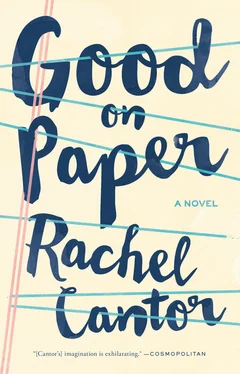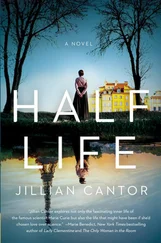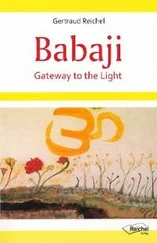Where to start?
What do you see up there? I asked.
The ceiling, Andi said, removing the cellophane from her pie. Is this a trick question?
You know what I mean, I said, already feeling I’d made a mess of it. In the corners.
Andi looked up at her metamorphosis mural, the portraits in the far corners.
You and Ahmad, she said reluctantly, and that stupid giraffe. Want a bite? she asked, hoping to distract me with a piece of the pie.
I shook my head.
Why do you think we’re up there? I persisted.
I don’t know, she said, biting a careful circle around the scalloped edges.
Don’t you? I said, unsure what I was looking for. Look at me, sweetie.
Andi looked up and shrugged, miserable. I wasn’t making her feel better, this much was clear.
Andi, sweetheart, we’re up there because we’re your parents and we’ll always be. Like the stars in the sky, we’ll always be there. Do you understand?
Yes, she said, and turned her attention to the center of her pie, eating the remainder in three precise bites. I wasn’t convinced.
Ahmad said you told Ovidio that Ahmad was your real father.
Andi said nothing. Her Scooter Pie gone, she had nothing to set between us. I reached over, wiped crumbs from her mouth.
You know Ahmad isn’t your biological father, your biological father lives in India, right?
I know that, Andi said, almost disdainfully. You’ve told me like a hundred thirty times.
Even if Ahmad isn’t your biological father, he’s your father in all the important ways, all the ways that matter.
She wouldn’t look at me, just crossed her arms tight.
He told you he was going to Pakistan?
No, she said.
Andi never lied — she was that desperate to change the subject.
Sweetie, I know he told you.
She nodded.
And this made you upset, I said, putting my arm around her. She wriggled under me. I put my hand in her hair.
Mom! she said, shaking her head to get my hand off her.
Why did it upset you to hear that Ahmad was going to Pakistan?
I don’t know. It didn’t.
Andi?
Silence.
Did you think he wasn’t coming back? I asked, because I knew her fear — that she’d be abandoned, replaced by other children in that faraway land which, like India, ate up fathers.
I didn’t think anything, she said, standing. Can I go now?
No, sweetie, you can’t. You have to sit with me some more.
I watched my daughter hesitate: She was me, at the turning. I could see it. She was at the turning away that said, I’m on my own, it’s better for me to be alone, I don’t need anyone, life with others is too painful — it couldn’t be too late to change that. Could it?
But how? Pretend hurt didn’t happen, pretend abandonment wasn’t possible? She already knew better. What might have made a difference to me at her age? What if my father had said, Come here, Shira . I put my arm around my daughter and said, Lovebug, and kissed the top of her head; this time she didn’t resist. I wanted to hold her so tight her heart’s fire might be ignited by mine. Convince her that the ice floe was always a choice we made, not a place we needed to stay.
Love is our harrowing , Esther had said, its sparks, sparks of fire . What if my father had sat me on his lap and called me his sweetheart and admitted his loss: Yes, I loved your mother more than anything; she wronged me and I was so hurt, I cut her out of our lives. Maybe I shouldn’t have done that. I know you miss her, I miss her too. And you know what, she misses you, I know she does . Would that have helped? It might have. It might have saved me years with T., my ex-husband, years protecting my heart from love. It might have helped me to know this.
But I knew it now, didn’t I? Wasn’t that enough? It would have to be. I took the proverbial deep breath, hardly sure what I was about to say.
It’s time I told you about your grandmother. I think you’re old enough, don’t you?
•
I told Andi what I could, that when I was her age, my mother went away and never came back. I was so sad inside, I thought I might die.
Andi’s mouth opened and she stared at me.
Sometimes I got angry, so angry it seemed I hated the people I loved most. Do you know what it feels like, Andi, to be so angry and confused?
She continued staring.
Sometimes I thought the only way I could keep living through all the sadness was to pretend it didn’t exist, to keep it inside, to never let anyone know how I felt. I tried to hold it back, but it never went away, because as it turns out, you can’t make sadness go away. You also can’t pretend it’s not there. I tried that and it just got stronger, it became a big hard lump in my throat. Do you know what that feels like, to feel so sad and alone?
Maybe, she whispered, sometimes.
I know! I said. It’s hard, isn’t it?
She nodded, her lower lip trembling. I squeezed her to me and again she didn’t resist.
I thought it was bad to cry, but I was wrong. You see, it’s alright to cry when you’re sad, and you know what, if you love people, sometimes you’re going to feel sad. Because they go away, or they make mistakes, or they hurt you. Sometimes they don’t mean to — they’re just not thinking or they’re confused because they’re sad themselves — do you understand? But that doesn’t mean we give up on them, right? Not if we love them. Instead, we act extra, extra brave, and you know what that means? It doesn’t mean we do it on our own, it doesn’t mean we keep our sadness inside. It means we say, Yes, I’m sad, but I’m going to give that person I love another chance, a chance to explain themselves, to do better.
I don’t want Ahmad to go away, my daughter sobbed, suddenly, into my chest. I don’t!
I know, my love. I know.

I got Andi another Scooter Pie, and whispered to Ahmad that she was okay, and watched, enamored, as she licked crumbs from her fingers. And thought again about my father, how he’d bound the arteries that led from his heart. My mother may have loved him — maybe she loved him still. But Romei proved himself better than all of us: he’d done what none of us was able to do, he’d exposed his heart for her. Would he win her back? I assumed he would, but maybe not. Maybe she’d never been his to have. The answer lay on the floor beneath my fax machine.
But first I called Benny and offered him the translation for Gilgul .
I hadn’t been in the study since that night three months before. I’d made Benny remove my computer; it sat awkwardly on a cardboard box on the floor of my room. The air in the study seemed musty — or so I imagined. Pages had indeed accumulated, scattering the floor like leaves. I’d imagined that with time they’d turn black and die, their words effaced, but no, they were bright and clear. And there — shit! — on a page by my foot, my name!
I’d become a character in Romei’s drama.
Of course I had, though I hadn’t seen it coming. Did I really want to read what he’d written? Meet a ghost of me, the doppelgänger Romei had created to stand in my stead? See myself portrayed as a freak in his funhouse mirror? He’d make me out to be cold, an unforgiving bitch — that’s how he saw me, right?
I didn’t want to see, but I had to see. I had to look. I couldn’t not look.
I could always stop reading if I had to.
I swept the pages into a folder. On the living room couch, I reminded myself where we stood. Last we knew, Dante was stalled, regressing even. Beatrice’s death had thrown him for a narrative loop. But he couldn’t backtrack forever: he had to move forward, eventually. And he does: he has a vision of Beatrice which gives him a way out of his no-way-out self, the circle line of his self-reflection. Beatrice in glory, again wearing crimson. He repents — performs t’shuvah , if you will — and returns to Beatrice, that goddess of the arrow, the straight-and-narrow narrative. Dante’s guiding image thenceforth is pilgrims , the romei who visit Rome, even his “pilgrim spirit,” which ascends to heaven to look at Beatrice — an event he experiences in words too subtle to grasp.
Читать дальше













